"When we are unable to find tranquility within ourselves, it is useless to seek it elsewhere." - Francois de La Rochefoucauld
***
"They would have liked to be rich. They believed they would have been up to it. They would have known how to dress, how to look and how to smile like rich people. They would have had the requisite tact and discretion. They would have forgotten they were rich, would have grasped how not to flaunt their wealth. They wouldn’t have taken pride in it. They would have drunk it into themselves. Their pleasures would have been intense. They would have liked to wander, to dawdle, to choose, to savour. They would have liked to live. Their lives would have been an art of living.
But such things are far from easy. For this young couple, who were not rich but wanted to be, simply because they were not poor, there could be no situation more awkward. They had only what they deserved to have. They were thrown, when already they were dreaming of space, light, silence, back to the reality, which was not even miserable, but simply cramped (and that was perhaps even worse), of their tiny flat, of their everyday meals, of their puny holidays. That was what corresponded to their economic status, to their social situation. That was their reality and they had no other. But beside them, all around them, all along the streets where they could not but walk, existed the fallacious but nonetheless glowing offerings of antique-dealers, delicatessens and stationers. From Palais— Royal to Saint-Germain-des-Prés, from Champ-de-Mars to the Champs-Elysées...
[Their state of employment] was not destined to last.
You can never remain just a market researcher for very long. Almost as soon as they are trained, researchers rush towards the higher rungs, to become deputy director or director of an agency, or to find one of those coveted jobs in some big firm, as director of, say, recruitment, or staff training, or industrial relations. These are the plum jobs: carpeted offices, two telephones, a dictaphone, a refriger ated cocktail cabinet and even, sometimes, hanging on the wall, a painting by Bernard Buffet. Alas, said Jérôme and Sylvie to themselves very often and sometimes to each other, you have to work to earn your crust, that’s obvious, but if you work you do not live. They thought they had learned that, in years gone by, from experience, of a few weeks’ duration. Sylvie had become a filing clerk in a market research consultancy, whilst Jérôme coded and decoded interview questionnaires. Their working conditions were more than pleasant. They turned up when they liked, read the newspapers in the office, went down for a beer or a coffee quite often, and they even felt a degree of liking for the work they performed in dilatory fashion, led on as they were by an exceedingly vague promise of proper employment on a regular contract and accelerated promotion. But they didn’t stick it out for very long. They were atrociously grumpy on getting up; full of resentment every evening, going home on the overcrowded metro; they would slump onto their sofa, dog-tired and dirty, and do nothing but dream of long weekends, free days and not getting up in the morning.
They felt locked in, trapped, done for. They could not resign themselves to such a fate. They still believed that masses of things could happen to them, that it was the fixed daily hours of work, the unending sequence of days and weeks that made the straitjacket which they did not hesitate to describe as infernal...
They liked their long days of idleness, their lazy wakings, their mornings in bed, with a pile of detective novels and science-fiction beside them, they liked their walks in the night, down by the riverside, and the almost elating sense of freedom that they felt on some days...
Of course they knew that was all wrong, that their freedom was just a will o' the wisp. Their lives were much more marked by almost panic-striken hunting for work each time (and there were many) one of the agencies they worked for went bust or got taken over by a bigger firm, by their days before pay when cigarettes had to be counted out one by one, by the time it took, on some days, to get invited out for a meal...
Long ago, they had let slip, work and freedom had ceased to be strict opposites; all the same, it was that opposition which was, for them, the determining factor.
People who choose to earn money first, people who put off their real plans until later, until they are rich, are not necessarily wrong. People who want only to live, and who reckon living is absolute freedom, the exclusive pursuit of happiness, the sole satisfaction of their desires and instincts, the immediate enjoyment of the boundless riches of the world - Jérôme and Sylvie had taken on this vast programme for themselves - such people will always be unhappy. It is true, they would admit, that there are people for whom this kind of dilemma does not arise, or hardly arises, either because they are too poor and have no requirements beyond a slightly better diet, slightly better housing, slightly less work, or because they are too rich, from the start, to understand the import or even the meaning of such a distinction. But nowadays and in our part of the world, more and more people are neither rich nor poor: they dream of wealth, and could become wealthy; and that is where their misfortunes begin.
Let us take a young man who does a year or two at university, then completes his military service honourably. Around the age of twenty-five, there he is, as naked as the day he was born, although he is also, by virtue of his education, already in virtual possession of more money than he ever wished for. That is to say, he knows with certainty that the day will come when he will have his flat in the city, his country cottage, his car, his hi-fi. It so happens, however, that these elating promises continue to evade his actual grasp. By their very nature they belong to a process which also includes, if you care to think about it, marriage, parenthood, a change in values, social attitudes and patterns of personal behaviour. In short, our young man will have to settle down, and it will take him fifteen years.
Such a prospect is not comforting. No-one embarks upon it without protest. For Christ's sake, our young lad thinks, am I going to have to spend my days behind these glass walls instead of going for walks in flowery meadows? Am I going to catch myself hoping the night before each promotion exercise? Am I going to calculate, connive, champ my bit, me, who used to dream of poetry, of night trains, of warm sandy beaches? And, taking it mistakenly to be a consolation, he falls into the trap of hire-purchase. Then he is caught, well and truly caught. All he can do is to gird up his patience. Alas, when he gets to the end of his troubles, our young man is no longer quite so young, and, to cap his misfortunes, it can even seem to him that his life is behind him, that it consisted only of his striving and not of what he strove for, and even if he is too cautious, too sensible - his slow climb has given him plenty of experience - to dare to say such things to himself, it will none the less be true that he will be forty, and straightening out his home and his weekend place and his children's education will have filled more than adequately the few hours he will have been able to spare from his work...
Impatience, thought Jérôme and Sylvie, is a twentieth-century virtue. At twenty, when they saw, or thought they saw, what life could be, the sum of bliss it held, the endless conquests it allowed, etc, they realised they would not have the strength to wait. Like anyone else, they could have made it; but all they wanted was to have it made. That is probably the sense in which they were what they are commonly called intellectuals.
For everything contradicted them, beginning with life itself. They wanted life's enjoyment, but all around them enjoyment was equated with ownership. They wanted to stay free, and virtually innocent, but time went by notwithstanding, and brought them nothing. The others ended up seeing wealth as an end in itself, but as for them, they didn't have any money at all.
They told themselves they weren't the worst off. Perhaps they were right. But modern life irritated their misfortune whilst it erased the misfortunes of others: the others were on the right track. Jérôme and Sylvie didn't amount to much: penny-scrabblers, freelancers, flitters. On the other hand, time, in a certain sense, was actually on their side, they had an image of a possible world which could seem exhilarating. But this, they agreed, was, by way of consolation, pretty small beer."
--- Things / Georges Perec
Saturday, November 26, 2011
Thanksgiving Reflections
I was at a Thanksgiving Dinner (though it had no Thanksgiving food) on Thursday, and each table was reflecting about what everyone was thankful for.
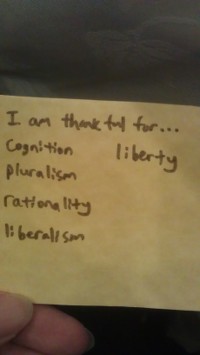
"I am thankful for...
- Cognition: which sets Man apart from the (lower) animals and enables us to reflect upon life
- Pluralism: because diversity makes life interesting
- Rationality: as it lets us adjudicate between competing truth claims
- Liberalism: because a spirit of tolerance permits freedom
- Liberty: which gives us the freedom to do what we want to do"
NB: Liberalism refers to attitudes, whereas Liberty refers to active restraints.
For example a formalised dress code would be a lack of Liberty, whereas other people mocking your outfit would be a lack of Liberalism.

"I am thankful for...
- Cognition: which sets Man apart from the (lower) animals and enables us to reflect upon life
- Pluralism: because diversity makes life interesting
- Rationality: as it lets us adjudicate between competing truth claims
- Liberalism: because a spirit of tolerance permits freedom
- Liberty: which gives us the freedom to do what we want to do"
NB: Liberalism refers to attitudes, whereas Liberty refers to active restraints.
For example a formalised dress code would be a lack of Liberty, whereas other people mocking your outfit would be a lack of Liberalism.
France/Spain 2011 - Day 8, Part 2 - Vizcaya Bridge, Santillana del Mar
"There is danger from all men. The only maxim of a free government ought to be to trust no man living with power to endanger the public liberty." - John Adams
***
France/Spain 2011
Day 7 - 23rd March - Vizcaya Bridge, Santillana del Mar (Part 2)
Our next destination was the Vizcaya Bridge, a Bridge in Biscay, Spain spanning the Nervion River and linking the cities of Portugalete and Las Arenas. It is also a UNESCO World Heritage Site.
There was a sign for Madrid and some other place (Alyucia? Ulyucia?) - in English and Arabic. Hah.
When we reached Getzo (one of the cities), we found that for once, we needed to pay for parking. The parking meter was a terminal where it was necessary to enter 0688 GWS, our license plate number. Maybe they have issues with people passing on parking chits.
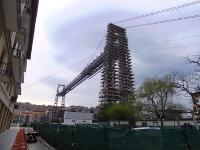
Vizcaya bridge
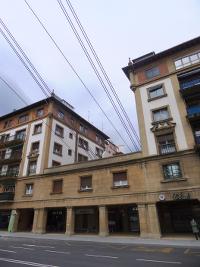
Cables going behind some houses
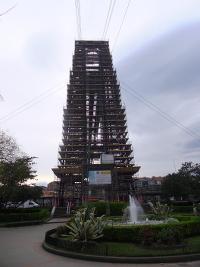
One of the towers. Under renovation unfortunately
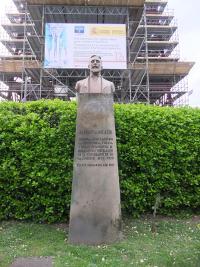
Bust of Alberto de Palacio, a disciple of Gustave Eiffel, who designed it.
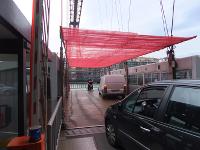
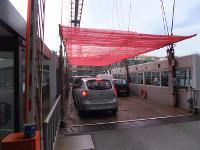
Cars and pedestrians getting on to the bridge. Pedestrians can also walk across on top.
Vizcaya Bridge in operation. It was the first transporter bridge I'd seen (and given how many are left, probably will be the last)
Soundtrack:
"It's free right?"
"Your head"
"Hello. Why is he so stupid?"
"It's no free ah?"
"Your stupidity will be recorded forever on YouTube now"
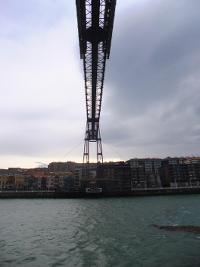
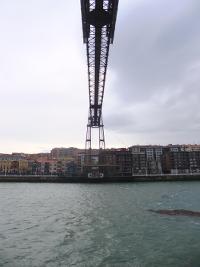
River and Gondola
This was also my 91st World Heritage Site, which meant I'd hit my 10% target.
There were 2 schoolgirls in uniform who were on the cusp of adolescence and wearing very short skirts. I didn't know the Spanish wore school uniforms - I thought it was a British thing. Anyhow this is one of the less meditated-upon aspects of the Unity of Mankind: teenage rebeliousness.
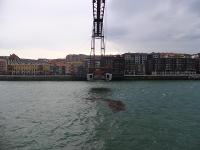
Gondola approaching shore
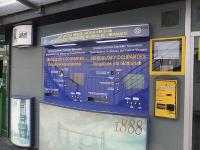
Ticket booth. Notice the lack of Spanish on the World Heritage text.
After gawking on foot it was time to drive across (as it was on our way!)
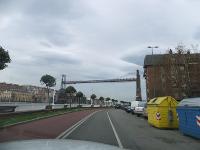
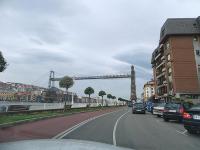
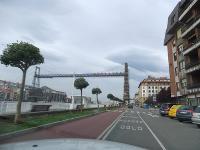
Bridge from afar
Getting on the gondola
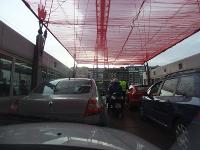
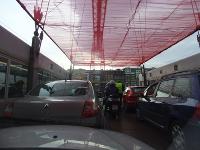
Killing time
Bridge in operation
The town opposite Getxo, Portugalete, was nicer.
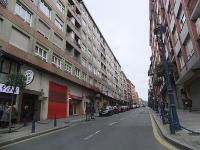
Steep street

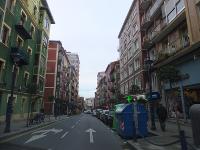
Street
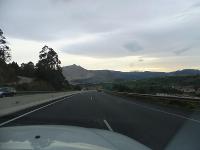
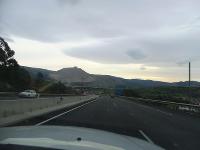
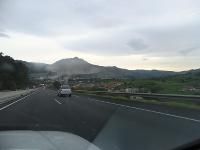
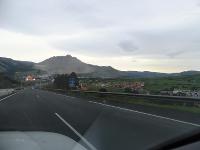
Rolling hills
Driving through windy mountain roads, it was no surprise to me why the Moors were unable to conquer all of Spain. I'm told Switzerland looks like this.
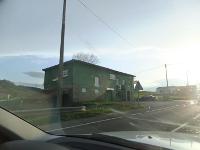
"Club"
This sad Club with a flashing neon sign was in La Helguera, a village on the way to Santillana del Mar.
There was a sign about an accident zone and needing to concentrate, then the end of the zone was marked with the same words and a no symbol ( ⃠). Presumably there was no need to concentrate after it.
We finally reached Santillana del Mar at 7+.
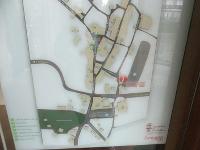
I think I took this to aid navigation.
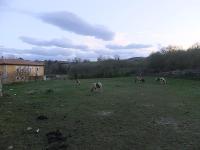
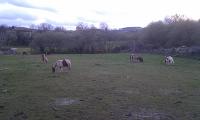
My Little Ponies. With shaggy manes. No I'm not a bronie.
Santillana del Mar was a town of hotels, shops and restaurants. Naturally this was very suspicious. Interesting nugget from Wikipedia: "There is an old saying that Santillana del Mar is The Town of Three Lies, since it is neither a Saint (Santo), nor flat (llana) and has no sea (Mar) as implied by the town's name".
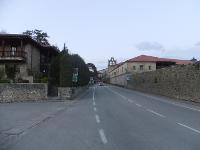
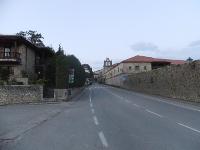
Street
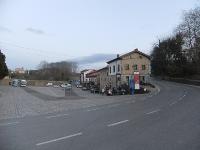
Coach park

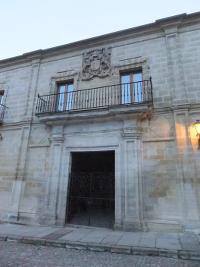
Crest on building
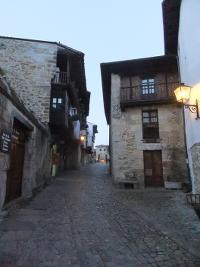
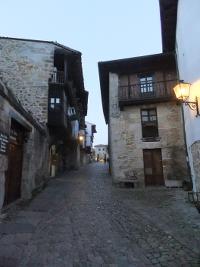
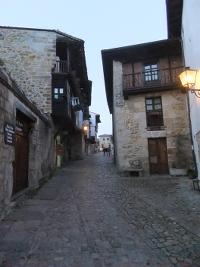

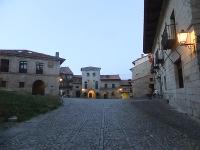
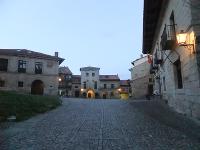
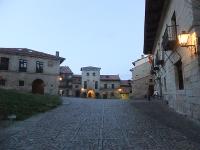
Square
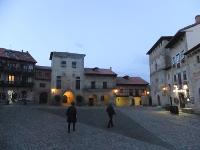
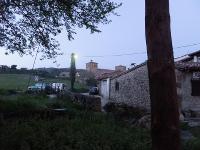
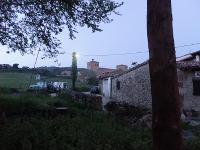
The Church of the Colegiata is in the distance
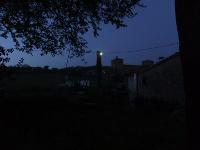
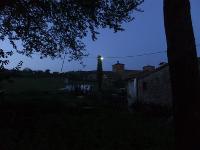
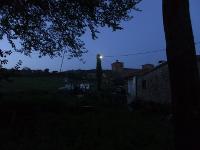
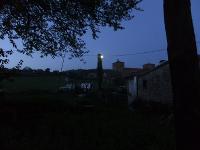
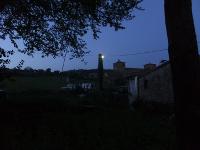
This set has the most accurate lighting level
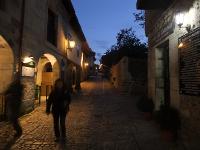
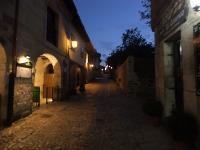
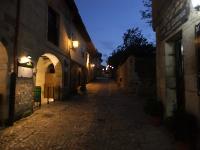
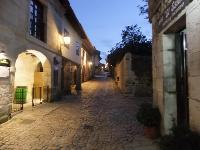
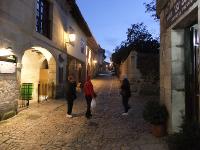
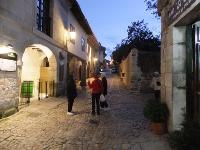
Tourists in street
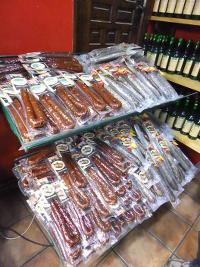


Sausages: venison and wild boar

How to sell lentils - with meat for a stew

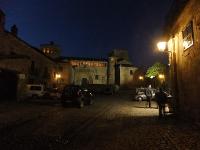
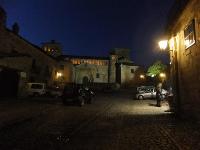
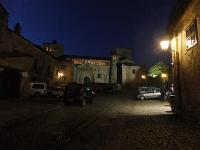
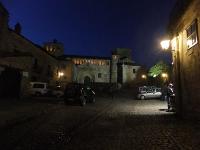

Church of the Colegiata
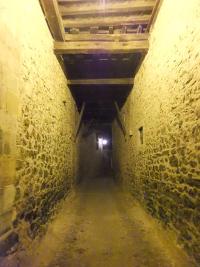
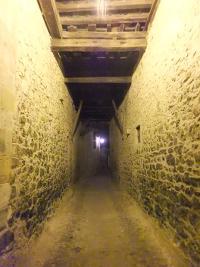
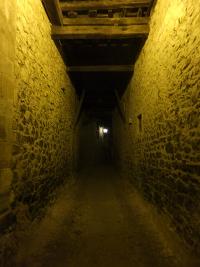
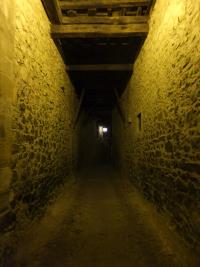
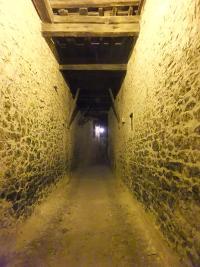
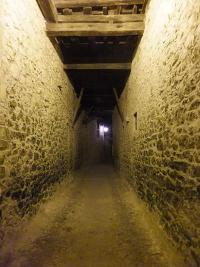
Different aspects of an alley
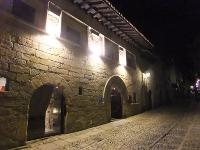
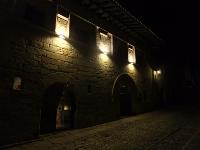
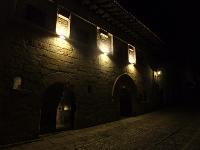
Hotel
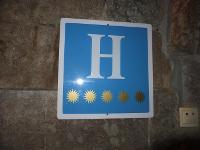
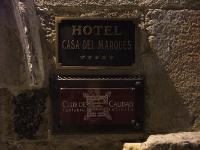
Hotel's stars and marks of distinction
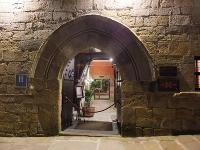
This hotel is so atas that you cannot enter
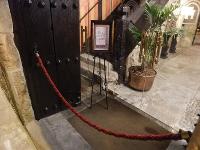
"Solo clientes alojados" ("Hotel Guests Only")
We then went for dinner.
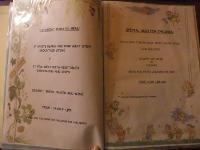
The "turistic" menu, where wine and water are interchangeble options; the turning of water into wine is less impressive after considering this cultural context. Also note that kids around the world have the same taste.
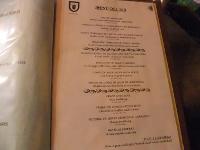
Menu del dia (menu of the day) - the one we ended up having. A lot more sumptious than the "turistic menu", of course.
I don't understand their pricing strategy: a 3 course menu del dia is cheaper than many a la carte dishes.

A sub-menu just for Fried eggs

Restaurant panorama
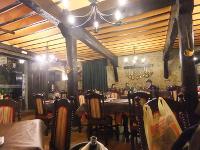
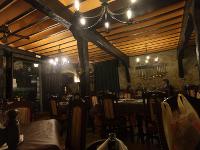
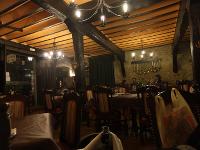
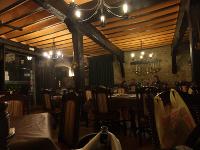
Restaurant scene
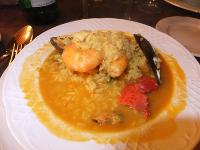
"Arroz caldoso a la marinera con bogavante (Battery seafood rice)"
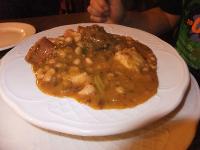
"Cocido Montanes (White bean stew pork and vegetables)"
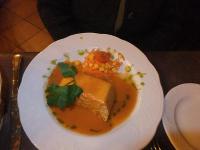
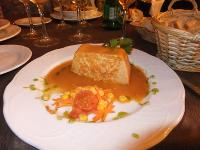
"Pastel templado de centollo en sasade cigalas (Spider crab pudding in seafood sauce)"
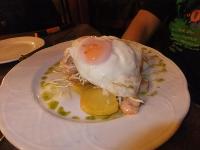
"Revoltijo de gulas y gambas (Fried eggs with baby eels, little prawns and chips)"
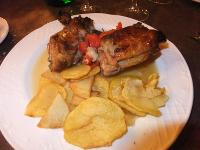
"Lechazo asado en su jugo con patata panadera (Roast lamb in sauce and chips)"
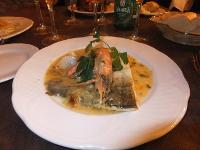
"Lomos de Bacalo en salsa verde (Cod loins in green sauce)"
It wasn't very green. And note the prawn!

"Natillas Caseras (Home made custards)"
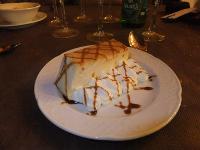
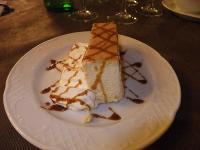
"Pudding de queso cremoso al caramelo (Cheese pudding)"

"Trufas de chocolatecon nata (Chocolate truffles and cream)"
The food we had for lunch had been ok and the dessert excellent. For dinner it was the reverse.
The GPS we rented was not very good. It marked non-existent roundabouts, we found roads which weren't marked on the map and one way roads were wrongly marked as two way.
Spanish cyclists are very pro. You can see them biking down country roads.
***
France/Spain 2011
Day 7 - 23rd March - Vizcaya Bridge, Santillana del Mar (Part 2)
Our next destination was the Vizcaya Bridge, a Bridge in Biscay, Spain spanning the Nervion River and linking the cities of Portugalete and Las Arenas. It is also a UNESCO World Heritage Site.
There was a sign for Madrid and some other place (Alyucia? Ulyucia?) - in English and Arabic. Hah.
When we reached Getzo (one of the cities), we found that for once, we needed to pay for parking. The parking meter was a terminal where it was necessary to enter 0688 GWS, our license plate number. Maybe they have issues with people passing on parking chits.

Vizcaya bridge

Cables going behind some houses

One of the towers. Under renovation unfortunately

Bust of Alberto de Palacio, a disciple of Gustave Eiffel, who designed it.


Cars and pedestrians getting on to the bridge. Pedestrians can also walk across on top.
Vizcaya Bridge in operation. It was the first transporter bridge I'd seen (and given how many are left, probably will be the last)
Soundtrack:
"It's free right?"
"Your head"
"Hello. Why is he so stupid?"
"It's no free ah?"
"Your stupidity will be recorded forever on YouTube now"


River and Gondola
This was also my 91st World Heritage Site, which meant I'd hit my 10% target.
There were 2 schoolgirls in uniform who were on the cusp of adolescence and wearing very short skirts. I didn't know the Spanish wore school uniforms - I thought it was a British thing. Anyhow this is one of the less meditated-upon aspects of the Unity of Mankind: teenage rebeliousness.

Gondola approaching shore

Ticket booth. Notice the lack of Spanish on the World Heritage text.
After gawking on foot it was time to drive across (as it was on our way!)



Bridge from afar
Getting on the gondola


Killing time
Bridge in operation
The town opposite Getxo, Portugalete, was nicer.

Steep street


Street




Rolling hills
Driving through windy mountain roads, it was no surprise to me why the Moors were unable to conquer all of Spain. I'm told Switzerland looks like this.

"Club"
This sad Club with a flashing neon sign was in La Helguera, a village on the way to Santillana del Mar.
There was a sign about an accident zone and needing to concentrate, then the end of the zone was marked with the same words and a no symbol ( ⃠). Presumably there was no need to concentrate after it.
We finally reached Santillana del Mar at 7+.

I think I took this to aid navigation.


My Little Ponies. With shaggy manes. No I'm not a bronie.
Santillana del Mar was a town of hotels, shops and restaurants. Naturally this was very suspicious. Interesting nugget from Wikipedia: "There is an old saying that Santillana del Mar is The Town of Three Lies, since it is neither a Saint (Santo), nor flat (llana) and has no sea (Mar) as implied by the town's name".


Street

Coach park


Crest on building







Square



The Church of the Colegiata is in the distance





This set has the most accurate lighting level






Tourists in street



Sausages: venison and wild boar

How to sell lentils - with meat for a stew






Church of the Colegiata






Different aspects of an alley



Hotel


Hotel's stars and marks of distinction

This hotel is so atas that you cannot enter

"Solo clientes alojados" ("Hotel Guests Only")
We then went for dinner.

The "turistic" menu, where wine and water are interchangeble options; the turning of water into wine is less impressive after considering this cultural context. Also note that kids around the world have the same taste.

Menu del dia (menu of the day) - the one we ended up having. A lot more sumptious than the "turistic menu", of course.
I don't understand their pricing strategy: a 3 course menu del dia is cheaper than many a la carte dishes.

A sub-menu just for Fried eggs

Restaurant panorama




Restaurant scene

"Arroz caldoso a la marinera con bogavante (Battery seafood rice)"

"Cocido Montanes (White bean stew pork and vegetables)"


"Pastel templado de centollo en sasade cigalas (Spider crab pudding in seafood sauce)"

"Revoltijo de gulas y gambas (Fried eggs with baby eels, little prawns and chips)"

"Lechazo asado en su jugo con patata panadera (Roast lamb in sauce and chips)"

"Lomos de Bacalo en salsa verde (Cod loins in green sauce)"
It wasn't very green. And note the prawn!

"Natillas Caseras (Home made custards)"


"Pudding de queso cremoso al caramelo (Cheese pudding)"

"Trufas de chocolatecon nata (Chocolate truffles and cream)"
The food we had for lunch had been ok and the dessert excellent. For dinner it was the reverse.
The GPS we rented was not very good. It marked non-existent roundabouts, we found roads which weren't marked on the map and one way roads were wrongly marked as two way.
Spanish cyclists are very pro. You can see them biking down country roads.